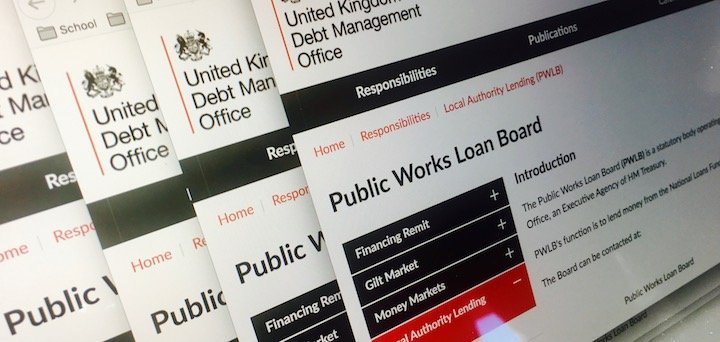Borrowing from the Public Works Loans Board (PWLB) is up significantly year-on-year, according the lender’s annual report.
The accounts reveal that the PWLB advanced 780 loans worth £5.2bn to councils during 2017–18. The figure is up from 622 loans totalling £3.6bn the previous year, a rise of 42% in the total amount advanced.
Figures included in the report also showed that the total sum of outstanding debt owed by local authorities to the PWLB rose 5.3% to £70.1bn in the year to 2017–18.
Plans to abolish the Public Works Loan Board have also been delayed by a lack of Parliamentary time caused by Brexit, the report said.
David Green, client director at treasury adviser PWLB said: “While outstanding PWLB loans increased by 5.3% year-on-year, outstanding loans from other sources increased by 13.2% to £37.5bn, with inter-authority loans accounting for most of the rise.
“So, the PWLB remains the largest lender to the sector, but its market share has fallen as authorities seek out cheaper and more flexible deals elsewhere.”
Duncan Whitfield, strategic director of finance and corporate services at London Borough of Southwark, told Room151 that more than half of councils in London had reduced their net borrowing through PWLB during the year, but he supported councils that had borrowed.
He added: “Those councils which are increasing their borrowing do so for a reason and in London much of that money is being spent to build new housing.
“If money is being borrowed to build places then we shouldn’t be knocking that. We should be celebrating it.”
The PWLB accounts showed a big rise in the proportion of new fixed-rate loans taken for the maximum period of 50 years.
In 2016–17, these made up 12% of the total, which rose to 25% last year.
The average period to maturity of fixed-rate loans increased to 23.4 years from 23.0 years over the year.
Early repayments of £32m were made during the 2017–18, down from £55m last year.
In February, the government announced changes to the investment code for local authorities, aimed at reducing the amount borrowed by councils to buy property outside their areas.
Legislation to abolish the PWLB was included in the Infrastructure Act 2015 and in May 2016 the government announced that it was proposing to transfer the body’s functions to the Treasury. But the move has been stymied by a legislative logjam due to Parliament’s need to tackle Brexit legislation.
Writing in the lender’s annual report for 2017–18, released earlier this month, PWLB secretary Jason Phillips said: “The government is exploring the ways it can deliver the reform given the current constraints within the legislative process.”
The delay is not likely to affect the ability of councils to borrow from the PWLB, as it is directed only at governance arrangements, Phillips added.












